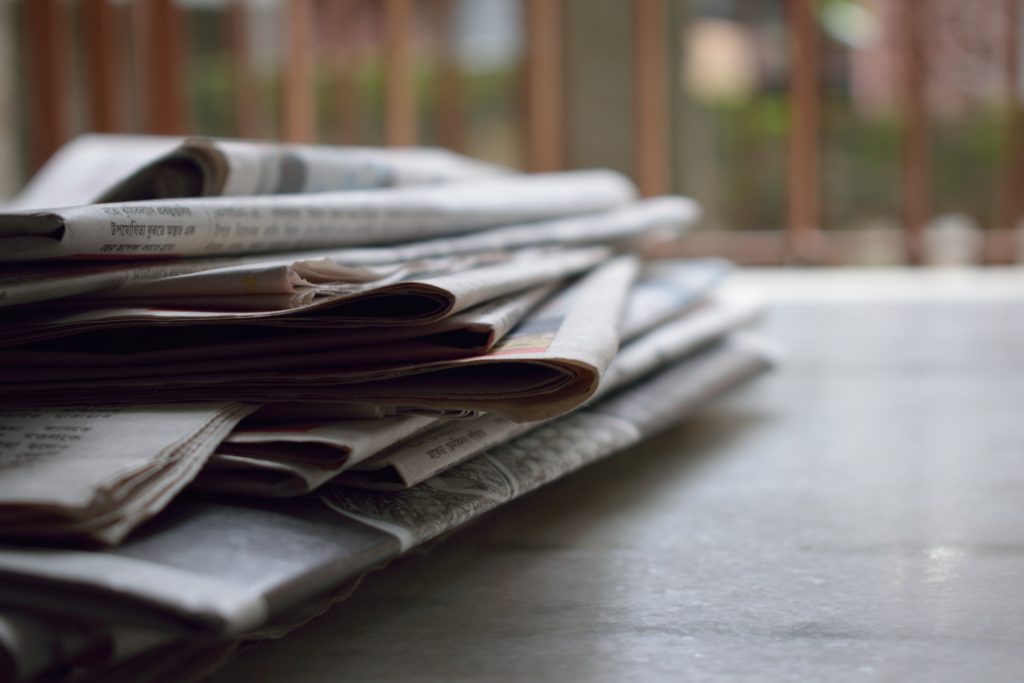Every town or city around the country has one, and while they face competition from national media, not to mention social media, the regional and local press still has a fundamental part to play in today’s media landscape.
We wanted to find out just what it’s like for these journalists today, so we caught up with Iain Smith, Editor of Alloa Advertiser.
Here he talks about his career, the worst habit of PRs and the challenges and opportunities the smaller newspaper faces today.
What do you read/where do you get your news (not your own)?
“Social media may be the quickest way of picking up breaking news – but it’s at the cost of reliability. The national tabloids are getting worse for click bait, but I find that local or regional press, by and large, maintain decent levels of fact-checking and quality control.
“But if it’s a leisurely read, I’ll find myself looking through Rolling Stone, Metal Hammer or The Guardian – just for a change of pace. Still, I am guilty of perusing the BBC sport gossip column.”
Did you always know you wanted to be a journalist?
“No, not at all. At one point I wanted to be a musician, but I never really went for it. Then, while I was working in a newsagent, I would read the sport sections from a bunch of papers and think to myself: ‘I could do that, no problem’. I dabbled in sport for a while, but quickly became disenchanted by it all and wanted to try my hand at crime and criminal justice issues. I developed a wider interest in news writing and it went from there.”
What are your career highlights to date?
“To be honest, the best part of my time in journalism was the early stages: when every little accomplishment and every step up was a big deal for me. First by-line, first big story, first front page and so on… Unfortunately, as you’d probably expect, enthusiasm wanes and even bona fide achievements can feel a little diluted. I know, I’m a ray of sunshine…”
What’s the best advice you have ever been given?
“I think a football coach once told us all at half time: ‘Keep the heid, and you’ll win the game’. It works for most things, to be honest, but what I take from it is that keeping calm under pressure is the best way to get this kind of job done. Take a breath and work on.”
What are the advantages of a good journalist/PR relationship?
“There’s no doubt that with newsroom resources on the decline, there is a need for clean PR copy to help keep things ticking over. Journalists are under no illusion that a tidy press release can be a life-saver, especially in patches where news can be slow to surface. If you can make it more local for the patch, let the editor or reporter know – even if all you can do is put them in touch with a local voice. You might think you’re just giving the reporter more work instead of providing them with a completed story, but it is what they would prefer.”
And what about the worst habit of a PR?
“Other than asking for PDFs? Probably the line which reads: Commenting, “Mr Jones” said: No, just no. Stop it. Never commenting. Just Mr Jones said.”
What challenges do journalists face today?
“For me, resources and public mistrust. A lot of industries are in the ‘must do more for less’ bracket – and journalism is no different. Almost every newsroom in the country would describe themselves, no doubt, as a shadow of their former selves. And it shows. There are instances where time has worked against you and, as a result, that story is not as good as it could have been. On top of that, the public will have very little sympathy for journalists in general. They appear to rate ALL reporters on the same level as national tabloid hacks and it can be a tricky prejudice to shake off.”
How do you prefer PRs get in touch with you? (e.g. Email/phone/in person/Twitter)
“I do like talking on the phone with some people and building up a rapport, but it’s not always practical. Email is best – you can respond in your own time and take it from there.”
What stories/angles are you looking for at the moment?
“Journalism is about people; how they and their families are impacted by something that has happened or happening. If you are struggling to sell a story, ask yourself: How does this effect a person, or how could they relate to the impact?”
How can the industry support new talent?
“Nothing educates like experience. It’s not always available, but offering some time in the newsroom to a student is the best way to develop skills and affords the opportunity to put the theory into practice.”
What challenges do you face as a regional newspaper?
“Unfortunately, regionals are still the little guy, but are expected to compete with national teams with much bigger budgets. It is gratifying to know you’ve beaten a bigger publication or TV channel to a story, but frustrating when your work is pinched and used to supplement someone else’s figures. Those in PR should maybe consider giving the little guy a break? Even from time to time?”
What opportunities do you have as a regional newspaper?
“On the flipside, regionals have the scope to cover stories that matter only to those in their patch. In doing so they have the chance to serve their communities better. It doesn’t matter how small the issue is, it will be important to some people.”
Need help getting in front of the right journalists and raising the profile of your business? Get in touch with our team of PR experts by emailing hello@representcomms.co.uk


